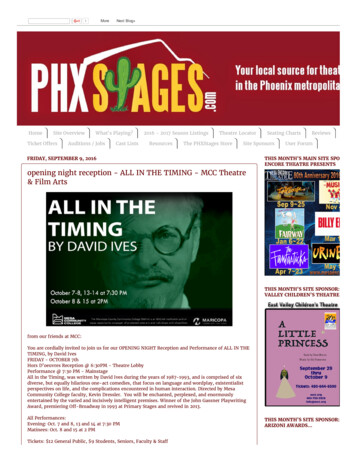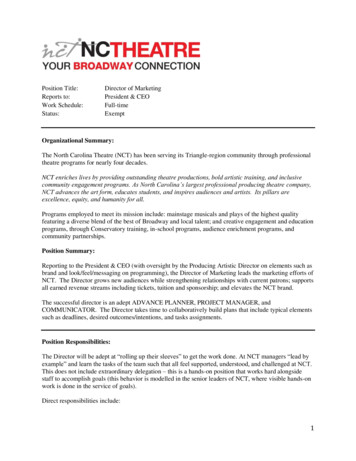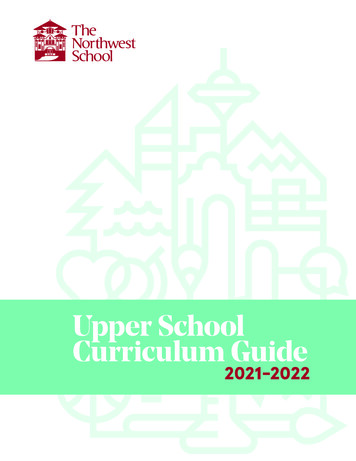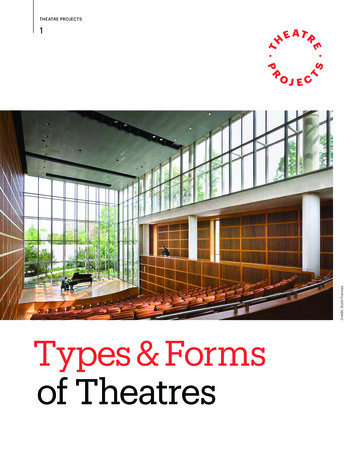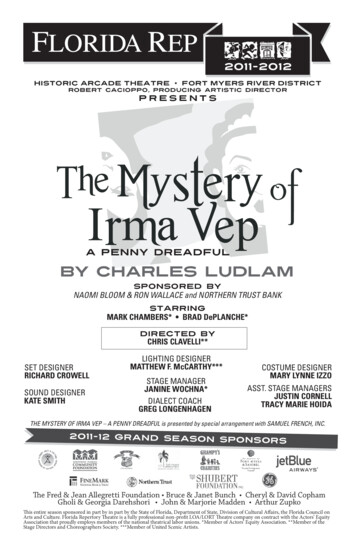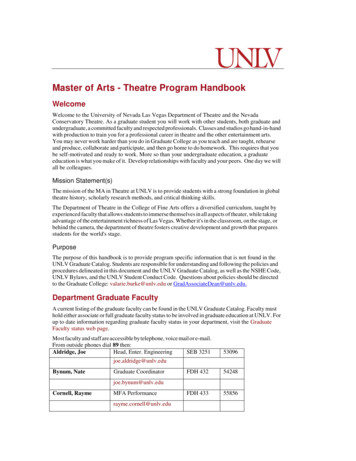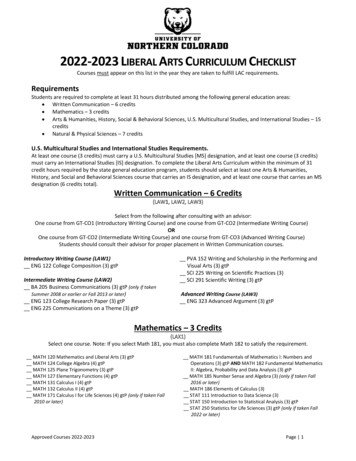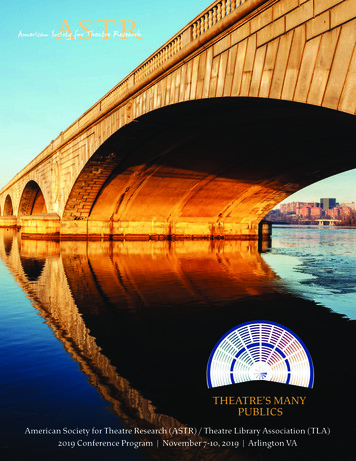![Nigerian Popular Theatre Alliance [NPTA] Further Dimension In . - HRMARS](/img/26/nigerian-popular-theatre-alliance-npta-further-dimension-in-trends-of-alternative-theatre-practice-i.jpg)
Transcription
International Journal of Academic Research in Progressive Education andDevelopmentVol. 1 , No. 1, 2012, E-ISSN: 2 2 2 6 -6348 2012 HRMARSNigerian Popular Theatre Alliance [NPTA] Further Dimensionin Trends of Alternative Theatre Practice in Ahmadu BelloUniversity, Zaria, NigeriaSamuel Okoronkwo Chukwu-OkoronkwoTo Link this Article: http://dx.doi.org/10.6007/IJARPED/v1-i1/10944DOI: 10.6007/IJARPED/v1-i1/10944Received: 06 January 2012, Revised: 09 February 2012, Accepted: 16 March 2012Published Online: 30 March 2012In-Text Citation: (Chukwu-Okoronkwo, 2012)To Cite this Article: Chukwu-Okoronkwo, S. O. (2012). Nigerian Popular Theatre Alliance [NPTA] FurtherDimension in Trends of Alternative Theatre Practice in Ahmadu Bello University, Zaria, Nigeria. InternationalJournal of Academic Research in Progressive Education and Development, 1(1), 207–215.Copyright: 2012 The Author(s)Published by Human Resource Management Academic Research Society (www.hrmars.com)This article is published under the Creative Commons Attribution (CC BY 4.0) license. Anyone may reproduce, distribute,translate and create derivative works of this article (for both commercial and non-commercial purposes), subject to fullattribution to the original publication and authors. The full terms of this license may be seenat: deVol. 1(1) 2012, Pg. 207 - DJOURNAL HOMEPAGEFull Terms & Conditions of access and use can be found tion-ethics207
International Journal of Academic Research in Progressive Education andDevelopmentVol. 1 , No. 1, 2012, E-ISSN: 2 2 2 6 -6348 2012 HRMARSNigerian Popular Theatre Alliance [NPTA] FurtherDimension in Trends of Alternative Theatre Practicein Ahmadu Bello University, Zaria, NigeriaSamuel Okoronkwo Chukwu-OkoronkwoTheatre Arts Department, Faculty of Arts, Nnamdi Azikiwe University, P. M. B. 5025, Awka,Anambra State, Nigeria.Email: sam okoronkwo@yahoo.com, cosamesq@yahoo.comAbstractThis study is sequel to “Trends in the Development of Alternative Theatre Practice: The AhmaduBello University, Zaria, Nigeria Example”. Unarguably, development in trends in the practice ofAlternative Theatre in Ahmadu Bello University, Zaria, Nigeria has been established from theforegoing study to have been dictated and directed by emergent constraints/limitations in theprocess. It is this transitional development, therefore, which was initiated on the platform of theSamaru Project, and then progressed into the Community Theatre, that ultimately gave rise toNigerian Popular Theatre Alliance [NPTA], a Non Governmental Organisation [NGO] that is not,however, bound by the university thrust to work with communities, using theatre as a tool fordevelopment. This study, therefore, focuses on Nigerian Popular Theatre Alliance [NPTA] as afurther dimension in trends of Alternative Theatre practice in Ahmadu Bello University, Zaria,Nigeria, to examine its role in the vanguard of Theatre for Development in a culturally pluralisticnation like Nigeria.Keywords: Nigerian Popular Theatre Alliance, Further Dimension, Trends, Alternative TheatreIntroductionNigerian Popular Theatre Alliance [NPTA] is a full-fledged Non Governmental Organisation [NGO]which is not bound by the university thrust to work with communities, using theatre as a tool fordevelopment; its emphasis being communication and development through alternative meansfor the rural and urban populace. The organisation which is a branch of Union of African PopularTheatre Alliance [UAPTA] – an off-shoot of International Popular Theatre Alliance [IPTA] – wasinaugurated in March 1989 in a workshop sponsored by Canadian University Services Overseas[CUSO]. NPTA has its principal organisational and operative base in Ahmadu Bello University,Zaria, and is mostly manned by the ‘collective’ in the University, with representatives at thezones. Considering Nigerian Popular Theatre Alliance [NPTA] as a development in trends in thepractice of Alternative Theatre in ABU, Zaria, Nigeria, emphasis on this study will centre on208
International Journal of Academic Research in Progressive Education andDevelopmentVol. 1 , No. 1, 2012, E-ISSN: 2 2 2 6 -6348 2012 HRMARSexamining its role in the vanguard of Theatre for Development in a culturally pluralistic nationlike Nigeria.The Role of Nigerian Popular Theatre Alliance [NPTA]As an initiative in this solemn task of examining the role of NPTA, the researcher will be lettingProfessor Oga Steve Abah who happens to be the foundation president of the organisation toguide us.“I see several roles for NPTA in National Development. First of all Ithink that one of the problems of Development in Nigeria is theparticipation by the people at whom development projects aretargeted. Development planning and implementation which areoften done by the bureaucrats and technocrats nearly alwaysgrumble as a consequence. The role of NPTA in this regard are[sic]twofold: One it should identify and cooperate with grassrootorganisation working as change agents within their communities.This will encourage enlightenment and participation. Secondly, theNPTA has as one of its programmes theatre for developmentworkshops. Each workshop should discuss development problems ofselected communities. Such workshops will provide the forum formembers of NPTA and the communities to share ideas on, discussthe communities’ problems. Overall these workshops are meant tosuggest levels of collaboration between the communities andappropriate agencies. It is also to suggest solutions, where possible,to the problems”. (Networker, 1989, p. 31)In carrying out the above mentioned roles, Nigerian Popular Theatre Alliance [NPTA] is alsoprojected to forge a profitable relationship with other development organisations/agencies in agood working partnership. One level of this relationship is at the community level where it isexpected to cooperate with grassroot organisations functioning as base groups in carrying outcommunity development. The other level in the relationship is at the national level. In the latterregard, the collaboration between Nigerian Popular Theatre Alliance and the defunct MassMobilisation for Social and Economic Recovery [MAMSER] in its Community Theatre project isworthy of mention, though not without its limitations. This collaboration became necessary asgovernment came to realise “the problems of isolated development planning and the need forinvolvement by the grassroots in debating not only development projects but also the politics ofdevelopment” (Networker Vol. 1, p. 1). Nigerian Popular Theatre Alliance has also forged aprofitable working relationship with Canadian University Services Overseas [CUSO] operating inNigeria among others. The collaboration with the Development Research Centre [DRC] of theInstitute of Development Studies, University of Sussex, whose work in Nigeria is being housedand coordinated from the Theatre for Development Centre [TFDC] – the research arm of NPTA –in ABU, Zaria is also testimony in the above regard. TFDC’s mission is geared towards promotingparticipatory development through the use of TFD, and other research and communication209
International Journal of Academic Research in Progressive Education andDevelopmentVol. 1 , No. 1, 2012, E-ISSN: 2 2 2 6 -6348 2012 HRMARSstrategies; while aiming to build the capacity of non-governmental organisations [NGOs],community-based organisations [CBOs], women’s groups and institutions through training,research, community outreach workshops and publications (Abah, 2003, p. xi). Abah furthernotes that the publication, Geographies of Citizenship in Nigeria, is “a major output” of “its firstmajor activity”, that of researching on ‘Citizenship Participation and Accountability’, to dissectthe different aspects of citizenship question in Nigerian polity.The researcher considers the foregoing background necessary as it will help to direct ourconsciousness in keeping track with the underlying indices that has shaped this particular epochin the discourse of trends in the development of Alternative Theatre practice in ABU, Zaria,Nigeria and to appreciate the more, the inherent process at this stage of its development;because as earlier stated, the emphasis on trends in Alternative Theatre development has alwaysbeen on the accompanying process of the emerging trends, process that has always conditionedand directed such trends as well as their various transitional and evolutional outcome.Considering these transitional and evolutional outcome on the background of development intrends so far from the Samaru Project and later Community Theatre, Abah (2008, p. 87) informsus, therefore, that:“On the bases of operating an NGO, we’ve been able to work withtwo communities and go beyond the two weeks of the theatreproject within the community to be able to source fund for them toactually put in place project. . one of those communities is Kwangain Plateau State where a multi-purpose grinding machine wasprovided for them by the Canadian High Commission. The same thingwas done in a community in Benue State, and if you read my book,Performing life: Case Studies in the Practice of Theatre forDevelopment, it’s a very detailed analysis of one of such workshopsin which the NPTA embarked upon. And it was our own way ofsaying, beyond the academic theatre practice which has its ownlimitations, where can we go?”Nigerian Popular Theatre Alliance has also embarked on several other community projects [referto Networker. Vol. 1. n/d, and Vol. 2. No. 1., April, 1997], among which is “Building Bridges:Promoting and Consolidating Peaceful Co-Existence In Nigeria”, both in Kaduna and Kano Statesand which has also been published in NTQ, the New Theatre Quarterly of the University ofCambridge, May 2007 edition (Kafewo, 2007). These projects which have continued to explorethe instrumentality of Alternative Theatre practice in its increasing role as a participatory mediumin the “democratisation of the processes of development” (Abah, 2005, p. xiv); especially when‘x-rayed’ from its transitional and evolutional phases as development in trends in ABU, Zaria, onlyreinforces Alternative Theatre as a continuously crystallising process rather than an end product.In this continuum, therefore, Alternative Theatre is not only a process, but also a viablecommunication tool. Two critical issues emerge here. First, it is a process; and second, it is acommunication tool. The process of doing theatre, therefore: the process of gathering210
International Journal of Academic Research in Progressive Education andDevelopmentVol. 1 , No. 1, 2012, E-ISSN: 2 2 2 6 -6348 2012 HRMARSinformation, doing analysis and building a play now becomes an empowering process for thelocal people; that in doing theatre, you are also developing skills of consciousness, of criticalawareness of situations that at the end of the play instead of the people saying they need water,they need electricity if those are their problems, it becomes rather how will they use theirresources and their capacity as a people to access those things from whatever available source/s.This emphasis on Alternative Theatre as a process and a means of communication focuses,therefore, on what Okwori (2008, p. 93) calls “the original ideology that articulated it, the fact ofgenerating education for critical consciousness”; that what now happens in the practice,therefore, is that at the end of every of workshop:“We end up with what we call CAP, Community Action Plan. And theCommunity Action Plan is, if the community themselves havearticulated five six ten problems., and the communitiesthemselves have exhaustively discussed these problems, some ofthese problems are amenable for solution at the local level, some beyond the communities to deal with, so these are then separatedinto categories. The ones that are amenable to solution at the locallevel, what are the strategies for addressing those things? So thecommunity is then left to the responsibility of developing thestrategies for dealing with the problem, putting a time frame withinwhich that problem can be addressed, putting those who will beresponsible for carrying out the problem, what resources will beneeded? What will be the means of verification that such a projecthas been done? What are the possible costs, and who will bear thosecosts? So this is simply what is called the Community Action Plan”.(p. 93)The current trend is such that the methods of research and investigation in the field hasexperienced a marked shift from other previous experiences and experiments to what he saysAbah has effectively tagged, “Methodological Conversation” (94); which means that drama,which in itself is a method takes on other research and other participatory methodologies. Inother words, there are other methodologies which will have to link with drama to produce amore effective result. So now instead of just drama alone, drama is now cohabiting andcollaborating and partnering with Participatory Learning and Action, PLA, or PRA, ParticipatoryRural Appraisal which are a body of tools meant for action research; so that a mixture of bothdrama and PRA now provides a more comprehensive and more effective provocation ofcommunity consciousness. The implication, therefore, is that while NPTA adopts“methodological conversation” as a research method, analysis of data from the research,rehearsals, play productions and post-production discussions still remain integral to the practice,as well as follow-through, all in the bid for the ultimate realisation of Alternative Theatre goals.211
International Journal of Academic Research in Progressive Education andDevelopmentVol. 1 , No. 1, 2012, E-ISSN: 2 2 2 6 -6348 2012 HRMARSProspect/New ChallengesIn February 2008, a conference was convened at the Ahmadu Bello University, Zaria, Nigeria as aforum to brainstorm on issues that border on Alternative Theatre practice. The conference hadbrought scholars and practitioners from far and near who among other considerations attemptedto appraise the over three decades of the practice in ABU, Zaria nay Nigeria on the backgroundof its inherent and emergent challenges.Based on the above background, therefore, arises yet the exigent need to attempt a predictiveprospect of Alternative Theatre practice in the 21st century against emerging global socioeconomic and even technological challenges. To this effect, Okwori (2008); Daniel (2008) areunanimous in locating the new challenge in the global information and communicationtechnology or in other words globalisation, as well as finance/funding. They cite the rapidprogression into the internet/GSM generation as posing a great threat to the oral medium andinter-personal relationship of live performance situations in attracting people to them and evenin the time they take.Regina Ode (2008) on her part has viewed the continued negotiation of development throughalternative theatre for Africa generally in the face of these technological challenges with so muchconsternation. She cites the fast extinguishing local cultures (which serve as the main tools ofoperation of this theatre) due to the increasing velocity of globalised information andcommunication networks as a serious issue of worry. She queries, therefore, to sum up her deepconsternation: “What are the chances of TfD negotiating development for Africa [generally] whenthe very tools of its functionality are being seriously challenged by globalization” (p. 14).Okwori, however, proposes the need to incorporate such technological devices into the systemas a tool in its campaign; and to domesticate the technology and bring it to the service of theatrefor development as a possible way of escape; what Daniel rather called “glocalisation” (p. 125).With regards to the challenge of the global information and communication technology, theresearcher also locates documentation as another major challenge that confronts AlternativeTheatre practitioners in ABU and the nation at large in the 21st century. The initiated efforts inthe past few years at proper documentation of Alternative Theatre activities should beaccelerated while embracing these new technologies, and made assessable too to appropriatebodies like conventional and university libraries and other research centres – both in and outsidethe country – to mention but few.For Kafewo (2008), the burden to continue to make itself relevant in the face of potential threats,is the greatest challenge of Alternative Theatre in the 21st century, to which he prescribesincreased advocacy. Talking from the perspective of a playwright who is weighed down by theburden of society, Yerima (2008) infers that “the twenty first century will still be one for reencountering sets of predictable and not so predictable social problems within society” forAlternative Theatre; even as he shares some of Owkori and Daniel’s views. He further highlightsthat “its characteristics therefore will [have] to be consistent with a theatre that is aimed at212
International Journal of Academic Research in Progressive Education andDevelopmentVol. 1 , No. 1, 2012, E-ISSN: 2 2 2 6 -6348 2012 HRMARSprobing and correcting social ills within society”; and whose plays “must be better focused richer in content, and must be more persuasive in message communication” (p. 6).Dwelling on ‘development’, which has remained the focal point of Alternative Theatre practice,Yerima advocates for inward reflection on the part of ABU Alternative Theatre practitioners inorder to find the basis for socio-political essence in incorporating cultural analysis towards aplausible methodological tool for analysing the process of protecting the forces of changes anddevelopment happening not only around them, but the entire nation at large. He calls for anexpansion of definition wherein “the word ‘development’ must acquire new meanings”, to “gobeyond socio-economic development”, and where ABU Alternative Theatre projects “mustembrace politics as a topic [if they have not already] to become more relevant in the twentyfirst century”. The projects must also redefine their meaning of ‘culture’ which he locates as “thekey to all development” (p. 9). This he says is because, quoting him extensively:Culture has gone beyond the ‘totality of the way of life of a people’.It has become in recent years, the only remaining element oforiginality of existence. Cultural differences have themselvesbecome tools for unity. The process of hegemony and counterhegemony have become recognized as tools for development - asproducts of inter-relationships among peoples. New problems arisethrough the process of inter-relationships, and so the ABU theatreprojects must be ready to assimilate these problems and pass themthrough its established process of analysis, development of ideas,play making, and performances. The ABU practitioners must beready to deconstruct and reconstruct old cultural ideas which theythink they have perfected over the years, because culture issubjected to constant influence and changes. The practitioners mustnote that the influences on culture create a form of hybridizationwith its own peculiarities. And they must therefore be prepared toachieve the basic aims and objectives of the popular theatrepractice. (pp. 9 – 10)On a summary note, the greatest challenge confronting Alternative Theatre practitioners in ABUand Nigeria at large in the 21st century, still guided by Yerima, however, is helping the nation andher citizenry to come to terms with the basis of their political reality given the exigencies of theover fifty years of her independence experience, in which she still gropes in the search for adefinition of the meaning of democracy. The gory post-election violence experience in Nigeria inApril 2011 polls, in which at least 800 people lost their lives according to an international humanrights group, is an eloquent testimony on the import of the above statement. Although the Aprilelections were heralded as among the fairest in Nigeria’s history, but they also were among thebloodiest,” said Corinne Dufka, senior West Africa researcher at Human Rights Watch. Reasonbeing the unacceptable stance which supporters of a former military ruler and main oppositioncandidate in the presidential election took over the pronouncement of incumbent president,213
International Journal of Academic Research in Progressive Education andDevelopmentVol. 1 , No. 1, 2012, E-ISSN: 2 2 2 6 -6348 2012 HRMARSGoodluck Jonathan as the winner, in taking to the streets of the largely Muslim Northern regionof the country, building barricades and burning properties. One would definitely not agree lessthat we are still groping in the dark in the search for a definition of the meaning of democracy;and therefore yet to find our political/democratic bearing as a nation in the face of suchdespicable and most condemnable experience. This really, is a big challenge; which AlternativeTheatre in its ever catalysing nature, the researcher believes, also has the potential to dare.Recommendation/ConclusionIf the nation and its citizenry, therefore, are to be helped by Alternative Theatre practitioners toappropriately dissect the basis of these enumerated socio-political realities, the process ofpersuasion and action outside of dramatic and theatrical parameters should of necessity beappropriately harmonised and concretised. This is also where the effort of the Theatre forDevelopment Centre [TFDC]’s initiative deserves commendation; it is no doubt a step in the rightdirection. However, its structures in its noble aim of building the capacity of NGOs and CBOs andother groups and institutions through training, research, community outreach workshops andpublications need to be prettily expanded and sustained too. Similar bodies also need to rise fromother regions of the nation as to actively collaborate in forging a formidable force in fosteringand accelerating the positive tenets of development which this theatre preaches, such that couldtruly foster a unified match towards the logic and attainment of our collective developmentaspirations as a nation.ReferencesAbah, O. S. (2008). Personal Interview (Appendix I). In Chukwu-Okoronkwo, S. O., “Trends inAlternative Theatre Development: ABU, Zaria Experience as a Case Study”. M. A. Thesis.Department of Creative Arts, University of Lagos, Akoka.Abah, O. S. (2005). Performing Life: Case Study in the Practice of Theatre for Development. Zaria:Tamaza Publishing Co. Ltd.Abah, O. S. ed. (2003). Geographies of Citizenship in Nigeria. Zaria: Tamaza Publishing Co. Ltd.Abah, O. S. (1989). The Politics of Popular Theatre and Television. In Networker. Newsletter ofthe Nigerian Popular Theatre Alliance [NPTA]. Vol. 1, June.Daniel, S. (2008). Personal Interview (Appendix I). In Chukwu-Okoronkwo, S. O., “Trends inAlternative Theatre Development: ABU, Zaria Experience as a Case Study”. M. A. Thesis.Department of Creative Arts, University of Lagos, Akoka.Kafewo, S. A. (2008). Personal Interview (Appendix I). In Chukwu-Okoronkwo, S. O., “Trends inAlternative Theatre Development: ABU, Zaria Experience as a Case Study”. M. A. Thesis.Department of Creative Arts, University of Lagos, Akoka.Kafewo, S. A. (2007). “The Rhythms of Transformation: Theatre and Conflict Resolution inNorthern Nigeria. In New Theatre Quarterly, Vol. XXIII Part 2. (May, 2007) CambridgeUniversity Press.Networker Vol. 2. No. 1. April, 1997.Networker Vol. 1. n/d. Non-Governmental Organisations (NGOs) Government Agencies andGrassroots Development.214
International Journal of Academic Research in Progressive Education andDevelopmentVol. 1 , No. 1, 2012, E-ISSN: 2 2 2 6 -6348 2012 HRMARSOde, R. (2008). “Negotiating Development for Africa through the Theatre in a Globalizing World”.Paper Presented at the 1st Conference on Popular Theatre/TFD in the 21st Century atAhmadu Bello University, Zaria, 25th – 28th February.Okwori, J. Z. (2008). Personal Interview (Appendix I). In Chukwu-Okoronkwo, S. O., “Trends inAlternative Theatre Development: ABU, Zaria Experience as a Case Study”. M. A. Thesis.Department of Creative Arts, University of Lagos, Akoka.Yerima, A. (2008). “Allegory of Persuasion: The ABU Popular Theatre Practice and the Challengesof the 21st Century”. Paper Presented at the 1st Conference on Popular Theatre/TFD in the21st Century at Ahmadu Bello University, Zaria, 25th – 28th February.215
in Ahmadu Bello University, Zaria, Nigeria . Samuel Okoronkwo Chukwu-Okoronkwo . Theatre Arts Department, Faculty of Arts, Nnamdi Azikiwe University, P. M. B. 5025, Awka, Anambra State, Nigeria. Email: sam_okoronkwo@yahoo.com, cosamesq@yahoo.com . Abstract . This study is sequel to Trends in the Development of Alternative Theatre Practice: The .
